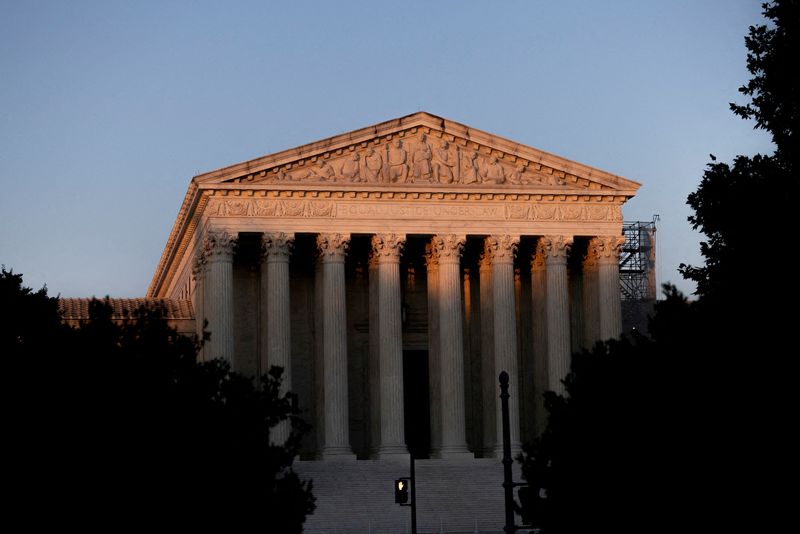By John Kruzel, Andrew Chung
WASHINGTON (Reuters) -The U.S. Supreme Court examined on Monday the U.S. Food and Drug Administration's refusal to let two e-cigarette companies sell flavored vape products that regulators consider a health risk to youths, while the lawyer for the businesses suggested President-elect Donald Trump could steer a different course.
The justices heard arguments in an appeal filed by the FDA under outgoing Democratic President Joe Biden's administration of a lower court's decision that the agency had failed to follow proper legal procedures under federal law when it rejected the applications to sell these nicotine-containing products.
This is the latest case in which the justices are scrutinizing actions by a U.S. regulatory agency, with the Republican Trump due to take office on Jan. 20 with a promise of broad deregulation.
Eric Heyer, the lawyer for e-cigarette liquid makers Triton Distribution and Vapetasia, suggested that Trump's return could prompt a shift in the U.S. government's approach to flavored vape products. Heyer alluded to Trump's vow during his campaign to "save vaping," despite having supported a ban on flavored vaping products during his first presidential administration.
"We have a new administration coming in. The president-elect is on record saying, I'm going to save flavored vapes," Heyer said. "We don't know exactly what that's going to look like."
E-cigarettes of various flavors are still easily available despite being illegal.
Triton and Vapetasia filed FDA applications in 2020 for products with flavors including sour grape, pink lemonade and crème brulee, and names including "Jimmy The Juice Man Peachy Strawberry" and "Suicide Bunny Mother's Milk and Cookies" - offerings that critics have said were designed to appeal to minors.
Some of the justices appeared skeptical of the contention by Triton and Vapetasia that the FDA improperly assessed their applications under a regulatory standard that differed from published guidance that the companies had relied upon.
Liberal Justice Elena Kagan told Heyer that the FDA had been "completely upfront" about its regulatory approach.
"So I guess I'm not really seeing what the surprise is here, or what the change is here," Kagan said. "Everybody basically knows that flavors are particularly dangerous in terms of kids starting the use of smoking products."
Conservative Justice Amy Coney Barrett expressed concern to Heyer that his position could require courts to defer to an applicant's interpretation of FDA guidance when a company is in a dispute with the agency.
"Can you walk me through how that can possibly be?" Barrett asked.
An FDA rule that took effect in 2016 under Democratic President Barack Obama deemed e-cigarettes to be tobacco products that, like traditional cigarettes, are subject to agency review under a 2009 federal law called the Tobacco Control Act. The law requires manufacturers of e-cigarette products to apply for authorization to sell nicotine vaping devices and e-liquids.
The Triton and Vapetasia applications were denied, as were hundreds of others by various companies involving more than a million flavored vape products.
To secure regulatory approval, e-cigarette companies must show their product would be "appropriate for the protection of the public health," meaning any health benefits - like helping traditional cigarette smokers transition to generally less-harmful vaping - must outweigh the risks of bringing the new product to market.
'ATTRACTIVE TO YOUTH'
Conservative Justice Clarence Thomas asked Curtis Gannon, the Justice Department lawyer arguing for the FDA, to address the claim by the companies that the FDA's requirements were "actually a moving target."
"They knew throughout that FDA was concerned about the fact that flavors are attractive to youth," Gannon said.
"The concern would be that they're getting addicted to ... nicotine at a time when nicotine is dangerous to their developing brains and may be, you know, sentencing them to a long life of needing to satisfy that addiction," Gannon added later in the arguments.
The FDA found that nearly one in five high school students and one in 20 middle school students used e-cigarettes in 2020.
The FDA has approved only 34 flavored e-cigarette varieties, all tobacco or menthol flavored. The agency maintains that it has not categorically banned flavored e-cigarette products. But companies face a particularly demanding health benefits-versus-risk legal test due to the FDA's finding that flavored e-cigarettes pose a "known and substantial risk" to youth.
Triton and Vapetasia in 2021 asked the New Orleans-based 5th U.S. Circuit Court of Appeals to review the FDA's denial of their applications.

In January, the 5th Circuit ruled that the FDA had been arbitrary and capricious, in violation of the Administrative Procedure Act, by denying the applications without considering plans by the companies to prevent underage access and use. Seven other federal appellate courts had sided with the FDA in similar cases.
The Supreme Court's ruling is expected by the end of June.